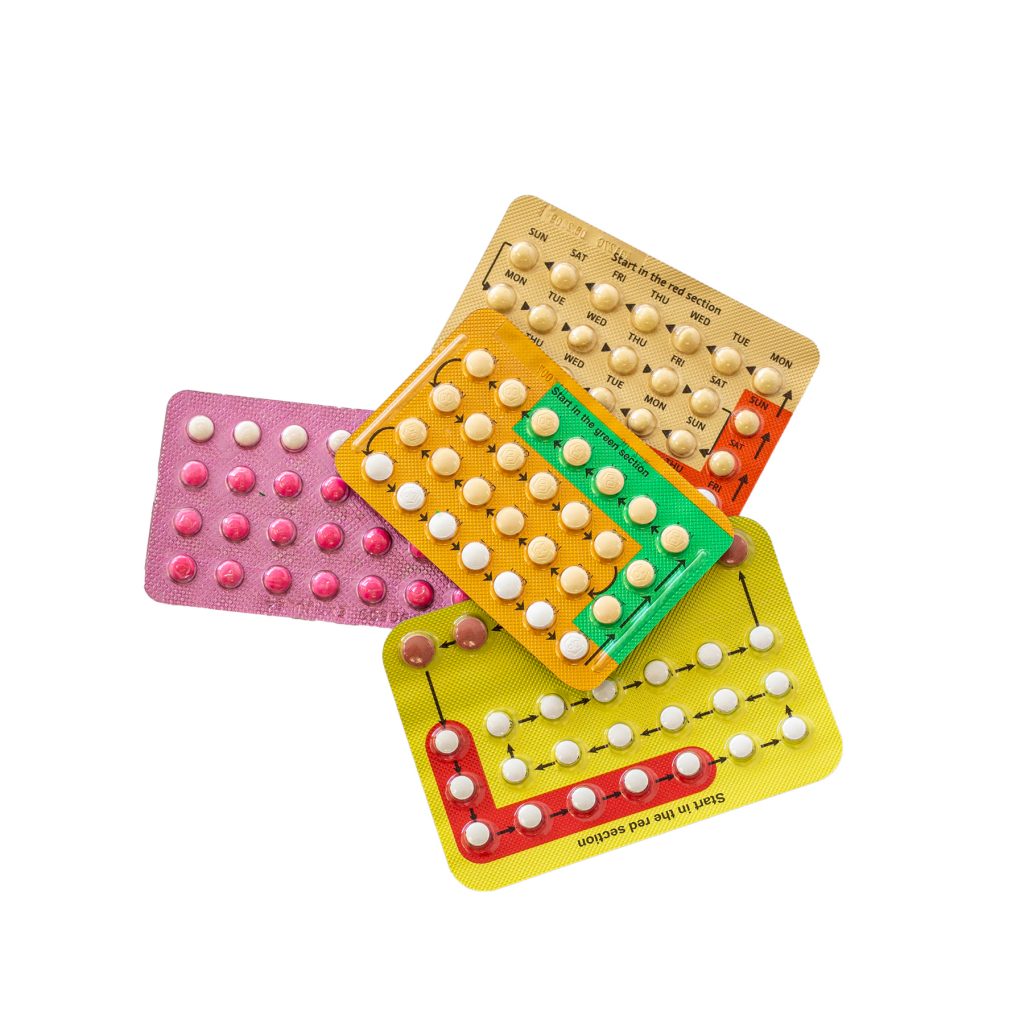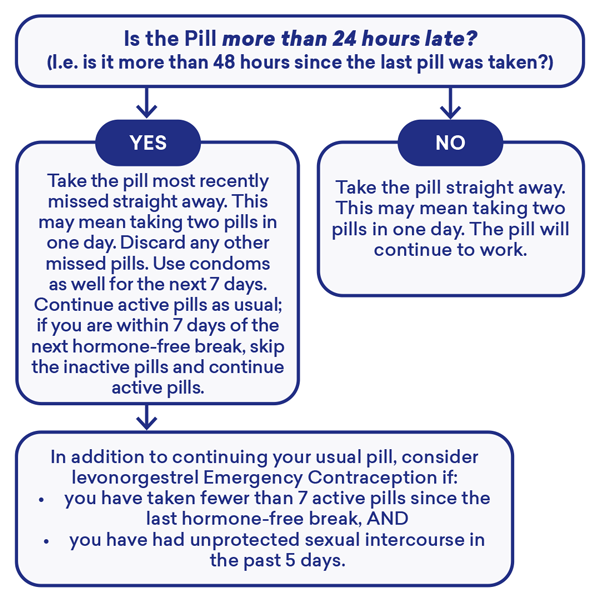What is the Pill?
The combined oral contraceptive pill (often called ‘the Pill’), contains two artificial hormones, oestrogen and progestogen, which are similar to hormones naturally produced by the body. While it is most commonly used to prevent pregnancy, many people also take it to help regulate their periods, reduce period pain, or improve acne.

What types of the Pill are there?
There are many different types of the Pill. Most come in a 28-day pack, which includes hormone (active) pills and up to 7 days of non-hormone (inactive) pills. When you take the inactive pills, you usually have a withdrawal bleed, which is like a period.
Different Pills contain different types and amounts of hormones. Each type has its own benefits and possible side effects, so it’s a good idea to talk to a doctor or nurse about which one might suit you best.
How does the Pill work?
The Pill works by:
- stopping the release of an egg by the ovary (ovulation)
- making the mucus (sticky fluid) at the opening of the uterus thicker so sperm can’t get through.
How effective is the Pill?
When taken correctly, the Pill is more than 99% effective at preventing pregnancy. In real life, where pills might sometimes be missed or taken late, it’s about 93% effective.
How do I get the Pill?
The Pill is available on prescription, which you can get from your doctor, SHINE SA clinics, community health clinics or youth health clinics.
How do I take the Pill?
- The Pill is immediately effective if started within the first 5 days of your menstrual cycle, which starts with the first day of bleeding.
- If you start taking the Pill after the first 5 days of your menstrual cycle, you need to use another form of contraception for 7 days before you will be protected from pregnancy.
- Some types of the Pill have different instructions for starting the pills. Always check with your doctor and the information on the packet.
- Take all the active pills in the packet until you reach the inactive pills. After you have finished taking the inactive pills you should start taking the active pills in your next packet. You should do this even if the withdrawal bleed hasn’t finished.
- You may want to continue using condoms while using the Pill because they help to protect you from sexually transmitted infections (STIs) and provide back-up contraception, particularly if you miss a Pill.
Can I skip my period?
You can skip the inactive pills and take only the active pills continuously, which means you should not get a withdrawal bleed. It is safe to do this even though some people may experience breakthrough bleeding. Talk to your doctor or nurse to get advice about the best way to manage this.
When is the Pill not effective?
The Pill may not be effective if:
- You miss a pill or take it more than 24 hours late
- You vomit within 3 hours of taking it
- You have very severe diarrhoea
- You are taking certain medicines or herbal remedies (check with your doctor, nurse or pharmacist).
See Missed pills for instructions.
What are the benefits of taking the Pill?
- Periods usually become more regular, shorter, lighter and less painful.
- The timing of bleeding can be controlled.
- The Pill can reduce the chance of cancer of the uterus and ovaries, benign breast disease, endometriosis and ovarian cysts.
- The Pill usually improves acne.
- The Pill can be used as a treatment for pre-menstrual symptoms.
- It’s easily reversible and has no effect on future fertility.
What are the possible side effects?
Serious health problems caused by the Pill are rare; the most dangerous is blood clots, usually in the legs or lungs (called thrombosis).
Other possible side effects can include:
- irregular bleeding
- headaches
- an increase in appetite
- nausea (feeling sick) – try taking the Pill with food or in the evening
- sore or tender breasts/chest (supportive bra can help)
- changes in mood, including feeling depressed.
These side effects often settle with time. If they continue or are very bothersome, see your doctor or visit a SHINE SA clinic, as switching to a different type of Pill may help.
For some people, the hormones in the Pill can cause patchy brown marks on the face (‘melasma’), especially if you spend a lot of time in the sun. If this happens, try to limit sun exposure and use sunscreen. The discolouration can take time to fade, even if you stop taking the Pill, and may sometimes need specialised treatment.
Who should not take the Pill?
The Pill is safe for most people. In general, the risks of taking the Pill are less than the risks of being pregnant.
The Pill is not suitable for someone who:
- has had a stroke, heart attack or high blood pressure
- has a past history or close family history of blood clots
- has certain types of migraine, diabetes or liver disease
- is over 35 years old and smokes
- has a body mass index >35kg/m2
- has been treated for breast cancer
- finds remembering to take a daily tablet difficult.
Tips for good Pill taking
- Take the Pill every day at a time that’s easy to remember.
- If you forget to take your pill you can take it up to 24 hours from the usual time to remain safe (up to 48 hours since your last pill), but it may cause irregular bleeding. See Missed pills for instructions.
- If you are taking the Pill to prevent pregnancy, do not stop taking the Pill unless you want to get pregnant or have started another form of contraception.
Missed pills

It doesn’t matter if you forget to take your inactive pills. It’s important to know that some pills have different rules that apply for missed pills. You should always check the information on the packet.
If you are worried about a missed a pill, contact a doctor or SHINE SA.
If you need to take Emergency Contraception (EC), it works best if taken as soon as possible. It can be used up to 5 days after unprotected sex. The most effective EC is a copper IUD. There are two types of Emergency Contraceptive Pills (ECP) available in Australia and your doctor or pharmacist can help you decide which is the best option for you. For more information on EC, see the SHINE SA Fact Sheet.
Updated December 2025.






